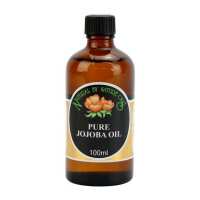
Natural by Nature Jojoba Oil is a fanastic antibacterial moisturiser that helps alleviate eczema, psoriasis, acne, razor burn, dry hair and chapped cuticles.Rich in Vitamin E, Jojoba Oil brings antibacterial and emollient properties that are particularly beneficial for those with eczema, psoriasis and acne. Having a close chemical composition to that of sebum, it's able to unclog pores while acting as a natural skin conditioner that helps sooth razor burn and chapped lips. You can even use it to hydrate hard cuticles dry hair.Directions: Gently massage the Pure Jojoba Oil into the affected areas. Combine jojoba oil with aromatic essential oils to treat oily or acne-prone skin.For external use only, unless specified. Do not use undiluted essential oils on the skin (except where indicated). Keep out of reach of children and pets. Keep away from eyes. Extra precautions should be taken during pregnancy (especially during the first trimester). Do not take essential oils internally. Do not apply essential oils to the skin when sun bathing. Certain essential oils should not be used while taking homeopathic medicines, as these can counteract the effects of homeopathic remedies. Some people may have an allergic reaction to essential oils. Always seek professional advice if unsure.100% Pure Jojoba OilWhat is the history of aromatherapy?Aromatherapy has a very long history, as early as 3000BC the ancient Egyptians used ointments to beautify their skin, hair and nails. The tomb of Tutankhamen built in 1350BC was found to contain jars of scented oils. The use of aromatic medicines and cosmetics were prevalent in Greece, with the Greek physician Hippocrates writing about several aromatic herbs such as Thyme, Coriander and Aniseed. The Romans were more lavish with their use of aromatics, using them to scent their baths, massage their bodies and scent their hair. The history of aromatics in India is equally ancient with exotic oils of Jasmine, Rose and Sandalwood being recorded in early Ayurvedic writings. In Europe aromatic herbs were used widely during the Great Plague of the Middle Ages. In 1928 the first book of aromatherapy was written by the French chemist Rene Maurice Gattefosse who worked with essential oils. Marguerite Maury, an Austrian biochemist, pioneered using essential oils in massage. She made a thorough study of the ways aromatics work both physically and emotionally. What is aromatherapy?Aromatherapy is the ancient art of healing using essential oils. Essential oils have powerful healing properties and there are a great many conditions that can be treated by these most natural of plant medicines. In aromatherapy treatments the essential oils are applied externally. Essential oils offer a gentle and sensitive alternative to synthetic drugs and medications. The most important property of essential oils is the balancing effect it has on the body; they also have a wide range of therapeutic properties.What are essential oils?Essential Oils occur in all the parts of plants: the leaves, flowers, fruits, twigs, bark, wood, roots and resins. There are many aromatic plants, but only some are used for the extraction of essential oils. The plants come from all over the world and most are collected and distilled in their country of origin. Essential oils are highly volatile and odorous, and therefore evaporate very quickly when exposed to air. They have a consistency more like water than oil and are not greasy. Most essential oils are clear to pale yellow but a few are coloured, such as Chamomile (blue) Patchouli (amber) Mandarin (golden).What are base oils?Base oils have good skin penetration, leaving the skin nourished and feeling soft and supple. It is important that only pure, cold pressed oils are used. There are a variety of base oils, below are some of the most popular:Almond Oil: Extracted from the kernel it contains vitamin D and is one of the most popular oils and least expensive used in massage.Avocado Oil; Extracted from the flesh of the fruit, it is rich in vitamins A and D, excellent for dehydrated skin and has a good absorption rate.Grapeseed Oil: Extracted from the grape pips, this oil has a light texture and is very popular for massage.Jojoba Oil: (pronounced ho-ho-ba) Extracted from the bean, it is rich in vitamin E and is a unique liquid wax used as an oil. It is fine penetrating, stable and long-lasting. Jojoba has a very close chemical composition to our skins own sebum (natural oils) It is excellent as a facial moisturiser and beneficial for spotty and acne conditions. Jojoba is an emollient for helping with eczema and psoriasis.Peach Kernel: Extracted from the kernel, it contains essential fatty acids and vitamins A and E. It is excellent for the face, encouraging suppleness and elasticity.Wheatgerm Oil: Extracted from the grain, it has a rich texture and is high in vitamin E, it can help reduce scar tissue and stretch marks. It is not suitable for massage due to its thick texture and strong wheat odour.How are essential oils distilled?There are several methods of extracting pure essential oils. Three of the most important methods are steam distillation, expression and solvent extraction.STEAM DISTILLATION: This method involves placing the plant material inside a distillation vat and passing steam under pressure from beneath the vessel. The heat from the steam causes the walls of the cells of the leaves, twigs, berries or other parts of the plant in which the essential oil is stored to break down and release the essential oil as a vapour. The essential oil vapour together with the steam is passed through cooling tanks which condenses the vapour so that it can be collected. The essential oil usually floats on the water and is separated out. Some of the fragrance of the oil is left in the distilled water and can be used as floral water sometimes called hydrolate.EXPRESSION: This form of extraction applies to only the citrus oils. The peel of all citrus fruits is full of oil glands containing globules of essential oils. The peel is separated from the pulp, this peel is then squeezed by simple pressure to press out the essential oil. Some juice will be extracted from the pith together with the oil, the solution is left to stand so that the oil and juice separate; the oil is then collected.SOLVENT EXTRACTION: The final products of solvent extraction are call absolutes, concretes or resinoids. This method is mainly used for some of the world’s finest and exotic flowers. The flower petals are placed in a sealed container, liquid solvent is allowed to flow over the flowers and completely cover them. The solvent will slowly dissolve the essential oils from the petals. This solution is collected and the solvent is then distilled off and returned to be re- used.On separation, a semi solid aromatic material called a concrete is left. The concrete contains some of the natural waxes and other non-aromatic materials, the concrete is shaken with alcohol; when the alcohol is distilled off, a coloured liquid is left, and this is called an absolute. Resinoids are similar to concretes but are extracted from the resins that exude from trees rather than flowers.How should I store my essential oils?Essential oils are delicate substances and are affected by strong light, heat, air and moisture. For protection they are best kept in a cool, dry and dark place. Avoid storing near heat, ideally, in a box, in a cupboard. Do not transfer your essential oils to plastic bottles, as the plastic will interact with the chemical makeup of the essential oils and the oils will cause the plastic to deteriorate. An essential oil stored in the correct conditions should last for years, citrus oils have a slightly shorter life. Base oils should be used within in 12-18 months once opened. Always wipe the lip and neck of the bottle clean before sealing the lid; this will help stop any excess oil going rancid.How should I handle my essential oil?Use a bottle with an inserted dropper or use a pipette, this will help dispense an accurate amount of essential oil. Always be careful to replace the right pipette or lid on to the correct bottle, otherwise you will contaminate your oils with different odours. Essential oils have different viscosities (thickness) some like Peppermint or Rosemary are very light while others like Patchouli and Myrrh are thick like syrup. Be careful with the lighter oils as they will pour out the droppers quickly while some of the heavier oils will take longer to come out.
About Victoria Health:
We are passionate about health and wellbeing and have long held a vision of radically changing the face of natural health.
We believe the products we recommend will make a positive difference to your health and wellbeing and we travel the world to source the most pioneering and cutting-edge supplements currently available.
With so much conflicting information about health products in the media, we will keep you up to date with the latest research and development in the field of complementary health.
We do not accept any form of advertising on our site and we will not list or recommend products unless we believe in them or use them ourselves.
Shabir is a qualified pharmacist specialising in natural health products with over forty years of experience and Gill was named as one of the top 1000 influential people in London in the Evening Standard Progress 1000 Awards in October 2019. Our strengths are our products, customer care profiles and our customers, who constantly support and inspire us.
We do not have outside investment and we have financed our own vision. Our philosophy is one of wisdom, education and evolvement for the enhancement of health, ageing and wellbeing.
We make a stand for truth, honesty and integrity in all that we are and all that we do.
Gill Sinclair & Shabir Daya MRPharmS
Phone:
020 8951 4144
Email:
customercare@victoriahealth.com
Location:
Victoria Health, Unit 5 Atlantic Business Centre, Stirling Way,
Victoria Health, Unit 5 Atlantic Business Centre, Stirling Way
Borehamwood
WD6 2FQ UK





